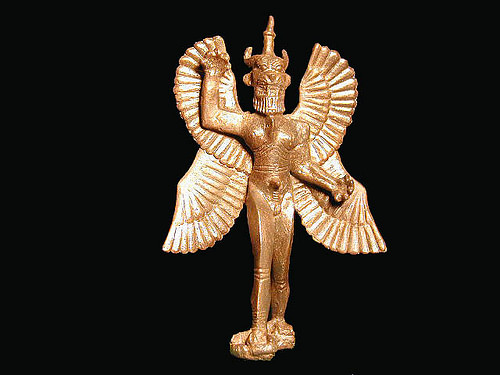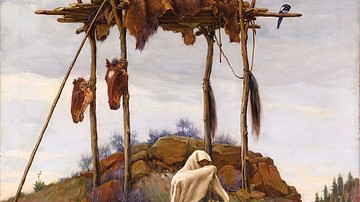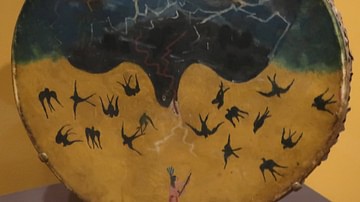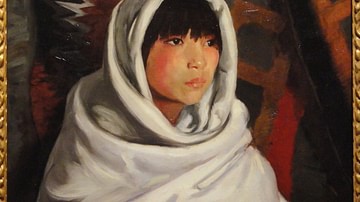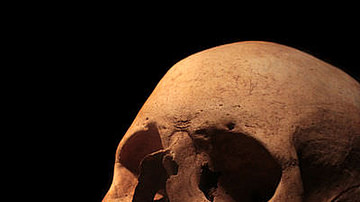Medicine in ancient Mesopotamia was based on the belief that illness was caused by supernatural agencies and, although medicines were given and injuries treated, magical spells and incantations were also understood as effective. Among these, the work known as Evil Demons Tablet 11, from the Old Babylonian Period (2000-1600 BCE) was used to banish spirits that caused sickness.
Illness was commonly understood as a punishment from the gods for sin – a person had done something, or failed to do something, that angered the deities collectively or one in particular – but could also be the work of demons or ghosts. Demons, especially the type known as the sebettu (also given as sebitti or sebittu), might be sent by the gods to afflict a person, but ghosts in ancient Mesopotamia were also understood to cause serious health issues.
Burial in ancient Mesopotamia was primarily concerned with the observance of proper rites to prevent ghosts from returning and causing problems for the living. Although some ghosts might occasionally slip out of the underworld on their own, the goddess Ereshkigal, Queen of the Dead, usually made sure the spirits of the departed remained in her realm of Irkalla, the underworld. She – with the approval of the other gods – would allow a spirit to return to haunt its family, however, if proper funerary rites had not been observed.
In some cases, though, a spirit or spirits that had returned to earth without authorization appeared in a city, village, or home to cause problems simply because they were unhappy with their fate. In these instances, a professional was called to recite a spell and send the souls back to where they belonged. The so-called Evil Demons Tablet 11 (a modern designation) was one of these spells, which, though parts of it might apply to demons, is thought to concern itself with ghosts and might properly be termed a ghost spell.
Mesopotamian Afterlife & Ghosts
The underworld was envisioned as a dim realm of eternal twilight, where the souls of the dead wandered aimlessly and without purpose, eating dust and drinking from puddles. Every soul that departed from earth went to this same place as there was no concept of a judgment of the dead on par with cultures such as Egypt, Persia, or Greece. The greatest king or lowliest peasant could expect the same experience after death and only differed in how their grave was tended and what offerings were made by the living. Scholar Stephen Bertman, citing Georges Contenau, describes the Mesopotamian afterlife:
In this region, illumined by no ray of light, wholly shrouded in dust, airless and lacking food and drink, the only sustenance of the spirits of the dead was the funerary offerings. If no man remembered them, then they returned to earth to plague the living, subsisting as best they might on such miserable scraps of food as they could find in gutters. Dwelling in a dark underworld called "the land of no return," the spirits of the dead hungered for the nourishment they had known in this life. In a world that was neither heaven nor hell, but a realm of endless emptiness, the dead longed for the food of remembrance. (281)
If a spirit was given leave to return and remind the family what was owed them, they would – usually – return to the underworld without incident. Even so, there were many, it would seem (judging by the spells, incantations, inscriptions, and mentions in literature) who either had no one to remember them or refused to return to Irkalla simply because they preferred to be beggars among the living than accept their place in the land of the dead. In such cases, a professional was called to deal with the situation.
Medical Approaches to Demons & Ghosts
A ghost was understood as the spirit of a human being who had died while demons were supernatural entities who had never had human form. The term 'demon' should not be understood according to its modern-day definition, but as the Mesopotamians recognized the concept, as noted by scholar Gina Konstantopoulos:
The English word "demon" is inherently problematic, implying a duality of good and evil that was not present in Mesopotamian religion and culture. Even the word "supernatural" has similar issues, as these figures were an accepted and integrated aspect of religion and society. In Mesopotamia, demons were often the external reason or cause for a number of ailments – such as illness, impotence, and even bad luck or misfortune – that could strike an individual. They could also, however, pose a threat to the society at large, to the gods, and to the fundamental ordered nature of the universe ... Demons, which we may understand as beings beyond the human sphere in their abilities, origins, and actions, could in some cases act either positively or negatively, fulfilling the former function when they were set as protection against another demonic threat.(Demons, 2)
The best example of this is the demon Pazuzu who was frequently invoked by medical professionals to drive off whatever lesser demon or demons might be causing the patient's illness, bad luck, or suffering. The sebettu, sometimes associated with the god of wisdom Enki, and others like them, might also cause health issues for humans, but, in this case, they were acting as agents of the gods, punishing sin or teaching a lesson. Even in these cases, however, the sebettu might go too far or linger too long and would have to be addressed by a health professional.
In Mesopotamia, there were two main types of physicians (both associated with the goddess of healing, Gula) – the asu, who treated illness with medicines – and the asipu, who depended on what today would be regarded as magical spells, incantations, amulets, and other objects or rituals believed to possess supernatural power. Konstantopoulos notes:
The front-line fighter against these malevolent threats was the asipu, who can be loosely equated with the term "exorcist"... The exorcist was a highly trained ritual specialist, one of a range of similarly specialized professions ... While the boundary between the asu and asipu was not always perfectly clear, in general the former treated the physiological symptoms of illness through pharmacological means, while the latter addressed the supernatural root cause of the affliction using ritual incantations ... The asipu had a range of supernatural tools at his disposal ... and worked with the protection and legitimation of the god Enki, or Ea, who was associated in turn with wisdom and benevolent, or overwhelmingly apotropaic, ritual magic. (Demons, 9)
Whether dealing with demons acting on their own, those who had gone too far in carrying out the will of Enki, or with all manner of ghosts, the asipu would first assess the situation – the way a modern-day physician would examine a patient's symptoms – and then decide upon a course of treatment that almost always involved the recitation of a spell, chant, or incantation.
Summary & Commentary
In the case of Evil Demons Tablet 11, after an opening prologue commanding the spirit's or spirits' attention and invoking the gods, the asipu specifically names the types of ghosts who might be causing the trouble, sending them back to the underworld. Scholar Irving Finkel provides a brief summary of the text regarding the types of ghosts involved, identified by their actions:
In lines 5 and 7 and 23-24, these ghosts spy on people; in lines 25-63, in contrast, they are right inside the house, right in the sick-room of someone already ill, with a range of torments and vindictive actions (including pulling faces and sticking out tongues!) designed to hasten the sufferer's end; in the hope that they will give up their own ghost and follow their torturers to the Netherworld. Lines 85-99 complement our established rollcall of revenants who came to a sticky end with one or two new cases and confirm the classic disturbed cases for whom there is no comforting family in the background ... the qualification 'So-and-So' indicates that this text was for recitation, where the name of the sufferer (and that of his father) would be inserted. This shows that a ghost is certainly the problem and represents a detailed, persistent attempt to foil its every mean trick. (77)
Finkel (among others) interprets Evil Demons Tablet 11 as a ghost spell because the entities mentioned seem to fit the definition of ghost more than demon (though, as he notes, some could apply to either). The link between the father's name with the patient's would be common simply as identification, but in this case, it might suggest that the father had something to do with the present situation.

The father was the head of the family in ancient Mesopotamia, and it was his responsibility to make sure the obligations to the dead were observed by the oldest son. If he failed in this, a spirit who had been given leave to return to the earth might attack a wife, the oldest son, younger son, daughter, or another family member, even though the father – by his lapse in not properly instructing his oldest son – had committed the offense.
Text
The following passage is taken from The First Ghosts by Irving Finkel, pp. 77-80. Ellipses indicate missing lines or words, while question marks suggest alternate translations for a word. The prologue in which the asipu addresses the spirits with, "I adjure" in the name of the gods is omitted, but the following lines should be understood as beginning with, "I adjure you ..."
Whether you are one who constantly clambers over mud walls ...
5. Who are the owl (?), the Watcher, who has evil at his disposal ...
Who ... whose god ...
Who are bennu, the Watcher of the night
Who constantly scratch like a wolf
Who constantly flash like lightning
10. Who constantly flicker like a flame
Who constantly ... like fire
Who constantly shine like daylight
Who constantly shine like a star
Who are constantly obscure like a black spot
15. Who overwhelm constantly like an alu-demon
Who constantly pick on victims like a Lilu-demon
Who constantly enter houses
Who constantly pass over thresholds
Who constantly clamber over roofs
20. Who constantly stroll about house foundations
Who are constantly present in holes
Who constantly seek a fine young man or fine young woman in the street
Who are the Watcher at noon
Who are the Watcher of that people say
25. Who constantly stand at the head of a sick person
Who constantly sit before the head of a sick person
Who constantly walk before the head of a sick person
Who eat with him when he eats
Who drink with him when he drinks
30. Who constantly frighten the sick person, So-and-So
Who constantly terrify the sick person, So-and-So
Who scare the sick person, So-and-So
Who constantly create obstacles before a sick person
Who constantly wrinkle the nose before a sick person
35. Who bare the teeth before a sick person
Who constantly sit before a sick person
Who constantly grind your teeth before a sick person
Who constantly put out your tongue before a sick person
Who constantly open your mouths before a sick person
40. Who constantly pretend to be lame before a sick person
Who butt like an ox before a sick person
Who display might like a wild ox before a sick person
Who are massive like a wild pig before a sick person
Who bark like a dog before a sick person
45. Who constantly moan like a badger (?) before a sick person
Who roar like a lion before an invalid
Who constantly slither like a snake before a sick person
Who constantly slither like a viper before a sick person
Who constantly slither like an adder before a sick person
50. Who constantly slither like a chameleon (?) before a sick person
Who constantly slither like worms before a sick person
Who constantly slither like a lizard before a sick person
Who are always dark like pulled-out hair before a sick person
Who are always a dark billy-goat before a sick person
55. Who are always like a dark she-goat before a sick person
Who are always black like a kid before a sick person
Who are always dense like a lamb before a sick person
Who are always ... like a fox before a sick person
Who always fly like a wasp before a sick person
60. Who always mingle like a cord before a sick person (?)
Who cover yourselves like a naked man before a sick person
Who are ever black like bitumen before a sick person
Who are white like gypsum before a sick person
Who constantly walk in the street
65. Who Constantly sit in the streets
Who constantly recline in the squares
Who constantly pick on the city of an evening
Who constantly prowl in the city of an evening
Who constantly seek out the city of an evening
70. Who constantly clamber over walls
Who constantly spread yourself in toilets
Who constantly squat in the foundations
Who constantly frequent houses
Who constantly leap over ditches
75. Who constantly hide in crevices
Who are exposed in the river
Who are slaughtered in the river
Who are divided at the river
Who are constantly doused in the river
80. Who prowl in the river when in flood
Who prowl in a river
Who constantly walk in forests
Who constantly sneak about in forests
Who tread paths
85. Who have no guide in the steppe
Who have been killed in battle
Who have been smitten with a weapon
Who have been smitten with a might weapon
Who have been slaughtered with a dagger
90. Who have been killed with a mooring pole
Who have been threshed with spikes
Who have been impaled on poles
Who have perished during destruction
Who have neither father nor mother
95. Who have neither brother nor sister
Who have no family, kith or kin
Who have neither son nor daughter
Who have heir to libate water
Who have been laid to rest among peers.
Conclusion
Once the spell had been recited, the spirit was expected to leave the patient alone and return to the underworld. In the above spell, there are many malevolent ghosts named who would not have been the revenants of family members but, whether they were unwanted intruders or visitors who had been given divine leave and then taken advantage of it, the incantation – often used in conjunction with amulets, charms, and scents – was expected to work just as any medicine prescribed by a doctor today would be in addressing a patient's symptoms.
Mesopotamians did not instantly call an asipu upon the appearance of a ghost, however; the spirit would need to have caused some difficulty, presented some problem, or triggered some illness to require the intercession of a medical professional. Finkel writes:
Family ghosts, when they did choose to make an appearance, did not always meet with fear or hostility if they were not too much of a nuisance: not infrequently, they were regarded with sympathy. A sudden manifestation, of course, would make anybody jump, but it seems that, for a Babylonian, just seeing a family ghost at first was a little like finding a mouse in the kitchen – a bit of a fright, a sense of irritation and the knowledge that something would have to be done about it. Encounter with a ghost, however, always had its implications, often varying far beyond simple fright to extreme ominous danger and physical or psychological sickness. (82-83)
The gods were understood to have established order from chaos, and part of their design included the brief time humans had to spend on earth. When that time was up, the soul of the deceased was expected to depart gracefully and quietly for the place reserved for it in the underworld. Most souls, it seems, met this expectation, but for those who did not, spells like Evil Demons Tablet 11 ensured that the ordered world would continue to function according to plan.


